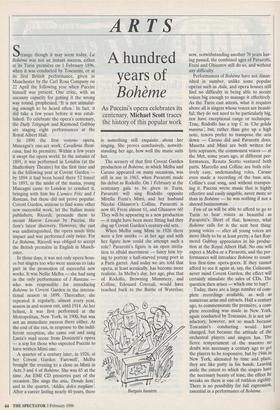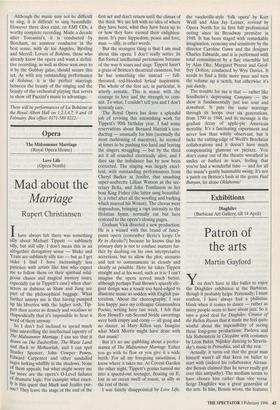ARTS
A hundred years of
Boheme
As Puccini's opera celebrates its centenary, Michael Scott traces the history of this popular work Strange though it may seem today, La Boheme was not an instant success, either at its Turin premiere on 1 February 1896, when it was conducted by Toscanini, or at its first British performance, given in Manchester by the Carl Rosa Company on 22 April the following year when Puccini himself was present. One critic, with an uncanny capacity for getting it the wrong way round, prophesied, 'It is not stimulat- ing enough to be heard often.' In fact, it did take a few years before it was estab- lished. To celebrate the opera's centenary, the Daily Telegraph and Raymond Gubbay are staging eight performances at the Royal Albert Hall.
In 1890 the first verismo opera, Mascagni's one-act work, Cavalleria Rusti- cana, had its premiere. Within a few years it swept the opera world. In the autumn of 1891, it was performed in London (at the Shaftesbury Theatre) for the first time and in the following year at Covent Garden by 1894 it had been heard there 52 times! In 1893, in the midst of the mania, young Mascagni came to London to conduct it, bringing with him his L'amico Fritz and I Rantzau, but these did not prove popular. Covent Garden, anxious to find some other new successful work, let the Italian music publishers, Ricordi, persuade them to mount Manon Lescaut by Puccini, the firm's latest discovery. However, the cast was undistinguished, the opera made little impact and was performed only twice. For La Boheme, Ricordi was obliged to accept the British premiere in English in Manch- ester.
In those days, it was not only opera hous- es but singers too who were anxious to take part in the promotion of successful new works. It was Nellie Melba — she had sung in the only performance of I Rantzau who was responsible for introducing Boheme to Covent Garden in the interna- tional season in 1899. Thereafter, she repeated it regularly, almost every year, season in and season out, until 1914. At her behest, it was first performed at the Metropolitan, New York, in 1900, but was not an immediate success there either. At the end of the run, in response to the indif- ferent reception, she came out and sung Lucia's mad scene from Donizetti's opera — a sop for those who expected Puccini to have written Mimi one.
A quarter of a century later, in 1926, at her Covent Garden 'Farewell', Melba brought the evening to a close as Mimi in Acts 3 and 4 of Boheme. She was 65 at the time. An EMI CD preserves part of the occasion. She sings the aria, 'Donde lieta, and in the quartet, Addio, dolce svegliare'. After a career lasting nearly 40 years, there is something still exquisite about her singing. She proves conclusively, notwith- standing her age, how well the music suits her.
The scenery of that first Covent Garden production of Boheme, in which Melba and Caruso appeared on many occasions, was still in use in 1963, when Pavarotti made his debut as Rodolfo. On 1 February at the centenary gala to be given in Turin, Pavarotti will sing Rodolfo opposite Mirella Freni's Mimi, and her husband Nicolai Ghiaurov's Colline. Pavarotti is now 60, Freni almost 61, and Ghiaurov 66! They will be appearing in a new production — it might have been more fitting had they dug up Covent Garden's century-old sets.
When Melba sang Mimi in 1926 there were a few smirks — at her age and with her figure how could she attempt such a role? Pavarotti's figure is an open invita- tion to ribald merriment — fancy him try- ing to portray a half-starved young poet in a Paris garret. And today we are told that opera, at least scenically, has become more realistic. In Melba's day, her age, plus that of Rodolfo, Browning Mummery, and Colline, Edouard Cotreuil, would have reached back to the Battle of Waterloo; Bargain hunters. now, notwithstanding another 70 years hav- ing passed, the combined ages of Pavarotti, Freni and Ghiaurov still do so, and without any difficulty.
Performances of Boheme have not dimin- ished in number, unlike some popular operas such as Aida, and opera houses still find no difficulty in being able to secure voices big enough to manage it effectively. As the Turin cast attests, what it requires above all is singers whose voices are beauti- ful; they do not need to be particularly big, nor have exceptional range or technique. True, Rodolfo has a top C in rhe gelida manina', but, rather than give up a high note, tenors prefer to transpose the aria down — Caruso did and Pavarotti does. Musetta and Mimi are both written for lyric sopranos, the commonest voices — at the Met, some years ago, at different per- formances, Renata Scotto ventured both parts. Marcello and Colline are both rela- tively easy, undemanding roles. Caruso even made a recording of the bass aria, Colline's coat song, and without transpos- ing it. Puccini wrote music that is highly effective and easily singable, never more so than in Boheme — he was nothing if not a shrewd businessman.
Few of us will be able to afford to go to Turin to hear voices as beautiful as Pavarotti's. Short of that, however, what Boheme calls for is the next best thing: young voices — after all young voices are more likely to be at least pretty, a fact Ray- mond Gubbay appreciates in his produc- tion at the Royal Albert Hall. No one will expect a Melba or a Pavarotti, and the per- formances will introduce Boheme to count- less first-time opera-goers. If they cannot afford to see it again at, say, the Coliseum, never mind Covent Garden, the effect will certainly stimulate the sales of CDs. The question then arises — which one to buy?
Today, there are a large number of com- plete recordings available, as well as numerous arias and extracts. Half a century ago, to commemorate the premiere, a com- plete recording was made in New York, again conducted by Toscanini. It is not sat- isfactory, however, not so much because Toscanini's conducting would have changed, but because the attitude of the orchestral players and singers has. The fierce temperament of the maestro no doubt was necessary a century ago to get the players to be responsive, but by 1946 to New York, alienated by time and place, they are like putty in his hands. Leaving aside the extent to which the singers have the necessary beauty of tone, the effect he wreaks on them is one of ruthless rigidity. There is no possibility for full expression, essential in a performance of Boheme. Although the music may not be difficult to sing, it is difficult to sing beautifully. However there does exist, on EMI CDs, a worthy complete recording. Made a decade after Toscanini's, it is conducted by Beecham, an amateur conductor in the best sense, with de los Angeles, Bjorling and Merrill. Lovers of Boheme, those who already know the opera and want a defini- tive recording, as well as those won over to it by the Gubbay galas, should secure this set. As with any outstanding performance of Boheme, it is the perfect marriage between the beauty of the singing and the beauty of the orchestral playing that serves to show off Puccini's music to advantage.
There will be performances of La Boheme at the Royal Albert Hall on 1,2,3,4,7, 9 and 10 February. Box office: 0171-589 8212.



































































 Previous page
Previous page